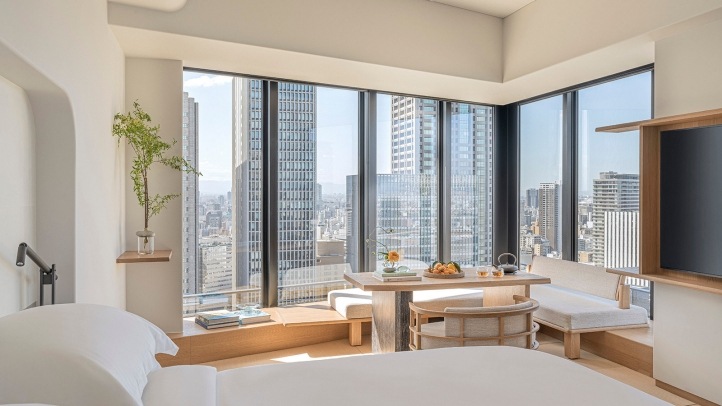 Home » HOTEL NEWS » Four Seasons Hotel Osaka Blends Modernity and Tradition with New Ryokan Experience
Home » HOTEL NEWS » Four Seasons Hotel Osaka Blends Modernity and Tradition with New Ryokan Experience
Saturday, August 24, 2024
Reading Time: 3 minutes 
On August 1, 2024, Four Seasons made its debut in Osaka, introducing the city’s first contemporary ryokan experience.
With a perfect blend of modernity and tradition, Four Seasons Hotel Osaka offers travelers a chance to immerse themselves in authentic Japanese customs, enhanced by the unparalleled luxury that the brand is known for.
“We are delighted to introduce GENSUI, a dedicated Japanese floor where guests can experience the timeless soul of Japan while still enjoying access to our Hotel’s exceptional facilities, including extraordinary dining outlets, a destination bar, and a sky-high wellness zone,” says General Manager Alastair McAlpine. “Marking a milestone in Osaka’s rise as a global destination, GENSUI offers an unforgettable stay for both international and domestic travellers.”
Guests have the option to split their stay between the tatami rooms and standard accommodations, ensuring they fully enjoy the offerings at Four Seasons Hotel Osaka.
A Modern Ryokan Retreat
Located on the 28th floor, GENSUI features 21 tatami rooms and suites, thoughtfully designed by the local studio SIMPLICITY to capture the essence of Japanese living. As guests step off the elevator, they enter a space that feels distinctly different from the rest of the Hotel, with even the staff attire reflecting a more traditional style. The check-in process, complemented by a Japanese tea service, sets the tone for an immersive experience.
After check-in, guests embark on a journey of contrasts. They navigate through dimly lit, serene corridors to arrive at bright, spacious rooms, bathed in natural light and offering panoramic views of Osaka.
GENSUI’s rooms and suites embody a refined expression of Japanese lifestyle aesthetics, merging traditional elements with modern comforts. Mirroring the layout of local homes, a doma entrance invites guests to remove their shoes and step onto the soft tatami mats, experiencing the traditional Japanese way of living.
Tatami mats, a staple in Japanese culture, have historically been used for various daily activities like dining, working, and sleeping. GENSUI offers travelers a chance to experience this integral part of Japanese culture without sacrificing modern conveniences.
The rooms feature custom-designed low chairs by SIMPLICITY, allowing guests to sit close to the ground. The chair’s circular design even encourages sitting cross-legged, promoting gentle stretching and flexibility.
Guests can drift into peaceful sleep on futon bedding placed on raised platforms, ensuring comfort for guests of all ages. The rooms are adorned with sliding doors, washi paper headboards, and sudare blinds, all contributing to a serene and authentic atmosphere. Soft lighting, reminiscent of traditional Japanese lanterns, enhances the room’s warm and intimate feel, accentuated by curved lines and rounded corners.
Each room includes comfortable yukatas (casual cotton kimonos) and a unique Japanese minibar. The bathrooms are equipped with a large bathtub and a shower area featuring a low stool, a typical Japanese design.
The Grand Tatami Suite offers a shared experience of modern ryokan living for families, with a sunken dining table for four, a bathtub with city views, a walk-through closet, and an adjoining room.
Taste of Local Culture
Guests staying on the GENSUI floor have exclusive access to the SABO lounge, where they can start their day with a bento-style breakfast. Freshly brewed Japanese teas and local snacks are available throughout the day, from 11:00 am to 8:00 pm. During evening drink hours, from 5:00 to 8:00 pm, guests can enjoy a selection of beverages with a Japanese twist, including local sakes, spirits, and wines.
The Story Behind GENSUI
The design of GENSUI is inspired by the twin concepts of “GEN” and “SUI,” which are carefully woven into the 28th-floor experience.
“GEN” represents the subtle colors within the darkest shades of black, symbolizing the hidden meanings in the darkness—a concept deeply rooted in Japanese culture. This idea is reflected in the dramatic use of dark hues and intricate details in the elevator lobby and hallway areas.
The carpets resemble traditional Japanese ink paintings with a fine gradation of black tones, while the washi-covered ceilings are adorned with calligraphy ink designs. The hexagonal wooden tiles feature the Kikko (turtle’s back) pattern, a symbol of good fortune.
“SUI,” meaning water, pays homage to Osaka’s identity as Japan’s “City of Water.” The essence of SUI is captured through flowing lines and curvilinear shapes, set against the backdrop of Osaka’s rivers and waterways. The gentle interplay of light and shadow throughout the space mirrors the natural harmony between water and land.

